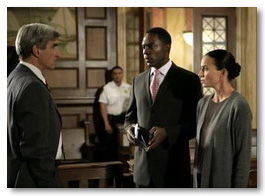The Oldest Morality Play
- CHARLES COLSON
It's an opening familiar to millions of Americans. A New York resident is walking down the street, minding his own business maybe arguing with his spouse or chatting with a friend.
 |
It's the beginning of Law and Order, one of the most popular cop shows of all time. And it's far from the only cop show on television these days. Police and courtroom dramas have all but taken over prime time: Bone, The Shield, The Closer, Without a Trace, three versions of Law and Order, and three variations of CSI.
What is it about these gritty shows that appeals to so many people? You might assume that they're popular because crime is out of control, and viewers find comfort in watching programs that show murderers and muggers getting their just desserts. But that can't be the case, because crime is down. So what's the answer?
I'm convinced that the popularity of cop shows reflects our God-given desire for justice and moral clarity. Our love of these dramas and before them, westerns reflect our acute awareness of the difference between good and evil, guilt and innocence. In this respect, cop shows are like mystery novels also hugely popular today.
Mystery novelist P. D. James points out that the finale of any mystery is a kind of Last Judgment. There's a moral rebellion expressed in the murder itself and the confusion that occurs in its aftermath. Finally, the moral order is restored. What was done under cover of darkness is now revealed in the light. Evil is punished; the innocent go free.
| In an age that rejects absolute moral truths, the popularity of cop shows is a healthy sign, because they point to the existence of a moral order that is intuitively understood... |
Cop shows are virtually the only place on television where it's acceptable to be morally judgmental. In an age that rejects absolute moral truths, the popularity of cop shows is a healthy sign, because they point to the existence of a moral order that is intuitively understood, and hence, to the truth of Christianity. Because we are made in God's image, we inherently crave to know that moral universe. We yearn for justice and absolute good. And that's why despite the corrosive relativism of the postmodern age we like stories that paint a picture of a moral universe, where evil is punished and righteousness triumphs.
If you have unsaved friends who enjoy police dramas, you might ask them why they like them so much. Help them understand that these moral dramas tap deeply into the needs of the human heart and reveal our longing for truth, for wrongs to be righted, for justice and, of course, redemption.
Even a TV cop show filled with graphic violence and rough language can give you an opportunity to point out that redemption comes, not from wise-cracking detectives ultimately, but from the Great Redeemer of history.
For further reading and information:
Shows about Nothing: Nihilism in Popular Culture from The Exorcist to Seinfeld by Thomas Hibbs.
“Whodunnit and Why We Do It,” a conversation between P. D. James and Ruth Rendell, The Times (London), 18 February 2006.
Jennifer Reese, “The Art of Murder,” interview with P. D. James, Salon, 26 February 1998.
Ralph C. Wood, “A Case for P. D. James as a Christian Novelist,” Theology Today (provided by Baylor University). Adobe Acrobat Reader required.
Lee Siegel, “Crime Scenes: Why Cop Shows Are Eternal,” New Republic, 23 March 2003. (Available to subscribers only.)
Sid Smith, “Evidence That TV Crime Shows Are Here to Stay,” Baltimore Sun, 21 February 2006.
Joe Milicia, “Criminals Taking Tips from TV Crime Shows,” USA
Today, 29 January 2006.
 This is J. Fraser Field, Founder of CERC. I hope you appreciated this piece. We curate these articles especially for believers like you.
This is J. Fraser Field, Founder of CERC. I hope you appreciated this piece. We curate these articles especially for believers like you.
Please show your appreciation by making a $3 donation. CERC is entirely reader supported.

Acknowledgement
Charles Colson. "The Oldest Morality Play ." BreakPoint Commentary February 23, 2006.
The Author

 Charles Colson (1931-2012) was an Evangelical Christian leader who founded Prison Fellowship and Breakpoint. Prison Fellowship has flourished into a U.S. ministry of 50,000 volunteers and has spread to more then 50 countries. Beyond his prison ministry, Colson was a Christian author, speaker, and commentator, who regularly confronted contemporary values from a biblically informed perspective. He wrote 15 books, including The Faith: Given Once, For All What Christians Believe, Why They Believe It, and Why It Matters, God & Government, Loving God, Answers to Your Kids' Questions, The Line Between Right & Wrong: Developing a Personal Code of Ethics, Against the Night: Living in the New Dark Ages, and How Now Shall We Live: A Study Guide.
Charles Colson (1931-2012) was an Evangelical Christian leader who founded Prison Fellowship and Breakpoint. Prison Fellowship has flourished into a U.S. ministry of 50,000 volunteers and has spread to more then 50 countries. Beyond his prison ministry, Colson was a Christian author, speaker, and commentator, who regularly confronted contemporary values from a biblically informed perspective. He wrote 15 books, including The Faith: Given Once, For All What Christians Believe, Why They Believe It, and Why It Matters, God & Government, Loving God, Answers to Your Kids' Questions, The Line Between Right & Wrong: Developing a Personal Code of Ethics, Against the Night: Living in the New Dark Ages, and How Now Shall We Live: A Study Guide.


